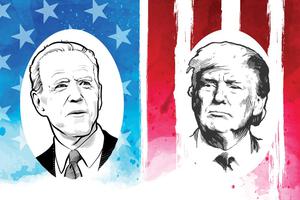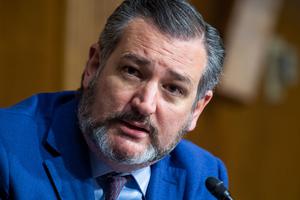Donald Trump and Joe Biden Campaigns Intensify Faith-Outreach Efforts — With a Focus on Catholics
The president’s campaign is highlighting his pro-life accomplishments and defense of religious liberty, while the Democratic nominee is emphasizing issues like immigration, the environment and moral character.

WASHINGTON — As Election Day draws nearer, the Trump and Biden campaigns have been appealing to communities of faith — including Catholic voters — by highlighting issues they believe will resonate with religious voters.
The Trump campaign outreach to religious believers has focused on the president’s pro-life accomplishments and defense of religious freedom, while the Biden campaign has emphasized issues like immigration and the environment, as well as moral character, and is avoiding discussion of his stance in favor of legal abortion.
The Trump campaign was first to increase its outreach efforts to Catholics earlier this year with the launch of “Catholics for Trump” April 2. The group’s 33-member advisory board includes co-chairman Newt Gingrich, former speaker of the U.S. House of Representatives and husband of current U.S. Ambassador to the Holy See Callista Gingrich, and several prominent pro-life leaders such as Marjorie Dannenfelser, president of the Susan B. Anthony List, Kristan Hawkins, president of Students for Life, and Janet Morana, executive director of Priests for Life and co-founder of the Silent No More Awareness Campaign.
In addition, many Catholic speakers were featured at the Republican National Convention last month, and a rendition of Ave Maria even closed out the event.
Justin Clark, Trump 2020 deputy campaign manager, told the Register that the president “is the most pro-life president in history, a vocal defender of religious liberty, and has appointed over 200 judges to the federal bench.” He added that “the contrast couldn’t be more clear” to former Vice President Joe Biden, who “has made it clear that, if elected, his administration will abandon principles of religious liberty, codify Roe v. Wade, and institute abortion on demand.”
Carl Cannon, RealClear Politics Washington bureau chief, told the Register that the Trump campaign has a “three-pronged” strategy for faith outreach.
“First, it wants to keep Protestant evangelicals in the fold,” he said. “Second, it is emphasizing an appeal to Catholics who are doctrinally conservative in a context that relates to partisan politics (i.e., pro-life). Finally, and this hadn’t got much attention, the Trump campaign is trying to peel away the votes of African American voters who are Christian — of any religious denomination — which was evident by the roster of speakers at the Republican convention.”
Biden Sidesteps Abortion
For its part, the Biden campaign unveiled “Catholics for Biden” this month with a focus on issues like building “an economy where everyone comes along and we protect the ‘least of these,’” serving as “stewards of creation” and pursuing a “humane immigration policy.”
One of the members of the list of the recently named co-chairs of “Catholics for Biden” is California Attorney General Xavier Becerra, who defended a state mandate that pro-life pregnancy centers promote abortion, which the Supreme Court ultimately ruled against in NIFLA v. Becerra. The list also includes Hillary Clinton’s 2016 running mate, Sen. Tim Kaine, D-Va., who, like Biden last year, changed his position in 2016 to back taxpayer funding of abortion.
Other co-chairs include Carolyn Woo, former president of Catholic Relief Services, Stephen Schneck, a former chairman of The Catholic University of America’s department of politics and a co-chair of “Catholics for Obama” in 2012, and four members of the Kennedy family.
A major difference between the faith-outreach efforts of both campaigns is that, in contrast to the Trump campaign’s focus on abortion, Biden’s agenda for the Catholic community contains no mention of abortion, an issue in which Biden is at odds with the teachings of the Catholic Church.
The question of how closely the Catholic voter must focus on abortion was addressed last fall when the U.S. Conference of Catholic Bishops specifically highlighted the abortion issue as the “preeminent priority” in the bishops’ new letter supplementing their faithful citizenship guidance for Catholic voters.
At that time, Archbishop Joseph Naumann of Kansas City, Kansas, chairman of the USCCB’s Committee on Pro-Life Activities, told the Register that abortion was the “preeminent priority” because “it’s a direct attack on life that happens in the sanctuary of the family so it destroys family relationships” and also due to the “sheer numbers” of the unborn killed by abortion, saying that “there’s nothing that compares: 60 million-plus since 1973 and millions still annually.”
According to Archbishop Naumann, following an ad limina visit in January, Pope Francis agreed with the U.S. bishops’ identifying abortion as the preeminent priority.
However, Bishop Robert McElroy of San Diego at the time argued against naming abortion as the “preeminent priority” and told the Register he believed “there are three preeminent issues in American public life today for the Catholic faithful citizen: One is abortion, one is the environment and one is immigration.”
Some Catholic bishops have recently revived that discussion.
Cardinal Joseph Tobin of Newark, New Jersey, said during a panel discussion earlier this month that “a person in good conscience could vote for Mr. Biden” and that “I, frankly, in my own way of thinking, have a more difficult time with the other option.” However, Cardinal Tobin later clarified to Catholic News Agency that his comments were not intended to endorse any candidate.
In contrast, Bishop Thomas Tobin of Providence, Rhode Island, tweeted in August that the Biden-Harris ticket marked the “first time in a while that the Democratic ticket hasn’t had a Catholic on it,” apparently in reference to the pro-abortion stance of Biden, who is a baptized Catholic.
Bishop Joseph Strickland of Tyler, Texas, also recently entered the debate, backing a video by Wisconsin priest Father James Altman that cited the Democrats’ stance on abortion as a reason that “You cannot be a Catholic and a Democrat.”
Religious groups campaigning against Biden have focused on the abortion issue, as well. The political advocacy group Catholic Vote has released a comprehensive report looking at his record on abortion and religious freedom, as well as marriage, health care and immigration. The group has launched a digital advertising campaign and is canvassing parish neighborhoods in swing states to call attention to Biden’s “anti-Catholic” record on these issues.
‘Common Good’ Catholics
Those doing religious outreach for Biden have argued that other issues should be considered as “equally sacred” to the abortion issue.
In materials they promote, “Catholics for Biden” cited Pope Francis’ words that while the “defense of the innocent unborn” must be “clear, firm and passionate … equally sacred, however, are the lives of the poor, those already born, the destitute, the abandoned and the underprivileged, the vulnerable infirm and elderly exposed to covert euthanasia, the victims of human trafficking, new forms of slavery, and every form of rejection.” The Biden faith-outreach campaign is promoting material that calls the “Pope Francis Voter” a person who looks at racism, poverty, immigration and health care as “sacred issues.”
Joshua Dickson, faith-engagement director at “Biden for President,” stated Sept. 14 that “the Biden-Harris agenda is deeply aligned with the common-good values of Catholics and people of faith and much more aligned with those values than what we see from the current administration.”
Patrick Carolan, Catholic outreach director for “Vote Common Good,” a group campaigning for Biden, told the Register that Biden’s message for religious voters is that “Joe Biden cares; he’s compassionate; he wants to bring us together, is respectful of everybody’s positions; he understands the difference of opinions, but we have to come together and not be divided.”
He referenced Bishop McElroy, who in a speech earlier this year said it’s important to consider the character of the candidate.
“If you look at these two candidates, there’s no comparison between their character and who is more Christian,” Carolan said.
“I think Catholics are going to look at the character of both candidates,” he said. “They’re certainly going to weigh on some issues, but I also think they’re going to look at who would best present an image of what a Christian is, what a Catholic is.”
Abortion, Religious Freedom
However, Joshua Mercer, editor of “The Loop” at the political advocacy group Catholic Vote, told the Register that Church teaching on abortion and growing concerns over religious freedom could, in fact, be a deciding factor for many Catholics. He said that while religious freedom may not be the leading issue overall with Catholic voters, “it could be the kind of issue that could flip somebody from supporting one candidate to the other.”
“The studies have shown that if we have taxpayer funding of abortion, there will be 50,000 more babies that will be killed next year, and that’s what’s on the ballot,” he said, adding that abortion is “not only one issue anymore.”
He contended that religious freedom has become increasingly tied to the life issue, as Democrats have taken aim at the Hyde Amendment’s defense of conscience-based objections to paying for abortion and have promised to renew the Obama administration’s legal battle with the Little Sisters of the Poor over the Affordable Care Act’s contraceptive mandate.
“Catholics were the last group to say Yes to Donald Trump in 2016,” Mercer said, “because there were reservations about character. … That’s why having four years of rock-solid defense of pro-life and religious freedom really helped him shore up that base.”
He said Democrats “want to talk about the fact that Joe Biden prays his Rosary” and “the state of his soul is between him and Our Lord, but when it comes to the concerns of Catholic voters, we don’t want to be forced to pay for legal abortions.”
New Poll
A new poll from EWTN News and RealClear Opinion Research, taken Aug. 27 to Sept. 1, found that the three top issues for Catholics are the coronavirus, with 73% of Catholics who are likely voters saying it’s a “major concern,” followed by the economy and jobs (70%) and health care (66%). Only 30% of Catholic likely voters called religious freedom and abortion “major concerns.”
However, among Catholics who accepted all or most Church teaching, a slightly higher percentage called abortion (37%) and religious freedom (36%) “major concerns.”
RealClearPolitics’ Cannon told the Register that it’s “a pandemic election,” as concerns over the coronavirus and its effect on the economy have overtaken concerns over other issues like abortion and religious freedom. “The president is being judged through this prism of the pandemic, and people are looking at issues that way, too,” he said.
However, Cannon added that he saw religious-liberty concerns as “increasing among Catholics,” and religious liberty is “one of those issues in which devout Catholics are dovetailing more with evangelicals.”
He highlighted the poll’s findings that 57% of Catholics are “very concerned” and 24% are “somewhat concerned” over recent vandalization and attacks on churches, and 50% are “very concerned” over calls to take down statues, murals and stained glass depicting Jesus as a “white European.” He said people of faith are equating those issues with attacks on religious liberty and have high levels of concern about it.
As for whose faith-outreach efforts have proven more successful, Cannon said some recent polling indicates the Trump campaign still has work to do in this area.
“An August poll by Fox News showed Biden with more than twice as much support among evangelicals as Hillary Clinton got in 2016,” he said,” which would be ominous news for Trump if it held up.”
But the poll’s sampling was undertaken before the Sept. 18 death of U.S. Supreme Court Justice Ruth Bader Ginsburg, which immediately triggered an intense political debate over the nomination of a new member of the court. That debate has the potential to shift voter dynamics significantly on a range of issues linked to the issue of Supreme Court judicial nominees — notably including abortion and religious freedom.

















